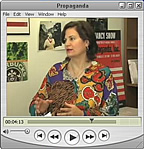Propaganda Politics
Today’s Campaign Advertisements Focus on Image,
Not Issues
November 1, 2006
By Valerie Orleans
It’s no longer “Morning in America,” judging by the
current crop of political campaign ads that are appearing this fall.
Ronald Reagan’s “Morning in America” television ads still
appear to be the gold standard by which other political campaign ads
are measured, according to Raphael
J. Sonenshein, professor of political
science. He said none of this fall’s ads for governor, nor the ads
for previous presidential elections, come close to besting Reagan’s
ads.
“The ‘Morning in America’ ads really generated a positive
response,” Sonenshein said. “If you see the ad, the focus is
on America, not Ronald Reagan. They tied Reagan’s reelection to all
the good things happening in America. They understood that life was more
important than politics to voters.”
It’s a different story today.
Nancy
Snow, associate professor of communications and propaganda authority
with two
books on political propaganda, points to the way candidates
position themselves.
“It’s kind of fun to watch,” she said. “In Gov.
Arnold Schwarzenegger’s campaign ads, you hear this patriotic music
and there are video images of him looking healthy and strong while voice-overs
tell us that taxes were not raised and 500,000 new jobs were created under
Arnold’s watch. There’s pageantry and dramatic visuals. Then,
there’s the contrast. You see this ridiculously awful shot of Phil
Angelides and the narrator tells viewers that Angelides is going to raise
your taxes. We call this card stacking. There is an obvious distortion — but
the fence sitters will pay attention. I think you’ll see a lot of
this ad just before the election.”
In contrast, Angelides’s ads seem, well, a little wimpy.
“The catch line for Angelides is that he’s a leader, not an
actor,” Sonenshein said. “Is there anyone who didn’t
know Arnold was an actor? Do they think people are smacking themselves
on the forehead and saying, ‘An actor? I thought he was a dentist!’”
Nevertheless, political advertisements seem to work, Snow and Sonenshein
said. “More people pay more attention to political ads than they
do to news reports,” Sonenshein explained. “TV coverage of
elections is really horse race journalism — it’s all about
who is ahead and by how much. TV news is reluctant to give information
on candidates. They’re more interested on reporting whether or not
the campaign tactics are working as far as persuading voters.”
Unfortunately, Sonenshein and Snow said they are seeing more tolerance
for campaigns that lie in their ads.
“I could go on television and tell everybody that you are a terrorist
and want to destroy America,” Sonenshein said. “I could use
photos that are doctored to look like you’re having a barbecue with
Osama bin Laden. But, I would make sure that an ‘independent group’ released
these ads so, when questioned, I could say that this is not something I
endorsed. I enjoy the down and dirty fights in politics as much as anyone,
but I find lying highly offensive.”
One example is how former presidential candidate Sen. John F. Kerry,
a Vietnam War hero, was subjected to false accusations about his war conduct
on a “swift boat” during the war. An “independent group” produced
a series of false ads claiming that Kerry did not act in a heroic manner
and may, in fact, have jeopardized his men. The ads generated a new verb — swift
boating — meaning a political attack on an opponent, resulting in
a benefit to the group spreading the rumor.
“Even after the ad was proved false, the media kept bringing it back
up by checking on the number of people who had been swayed by the ad, how
the president was responding and so forth,” Sonenshein said.
Besides bold-faced lies, there is deception. For example, a proposition
sometimes is given a name that has an overwhelmingly positive connotation
like the Clear Skies Initiative, Snow said. “I mean, who is against
clear skies? But, essentially, the Clear Skies Initiative would result
in significantly fewer reductions of air pollution and weaken the Clear
Air Act, according to the Sierra Club. While some communities might see
clearer air, more would not.”
As such, ads cloud the issues and political candidates are focusing
less on issues, even during debates, Sonenshein said.
“A lot of the debates get carved up into ads,” he said. “If
one of the candidates stumbles and makes a mistake, you can bet his or
her opponent will seize the opportunity to use that. Then, you get the
commentators saying things like, ‘The guy sighed too much.’ The
issues tend to get lost, or so deeply buried, that the typical voter isn’t
going to take the time to consider them.”
As voters prepare to go to the polls this month, Sonenshein predicts
they will be bombarded with negative ads.
He predicts blogs also will take on an increasingly important role.
“I like blogs,” Sonenshein said. “They represent the
free market of ideas and they present a real challenge to mainstream media
because they get their messages out quickly. They also tend to be less
cautious. Many politicians don’t like blogs because of that.”
“A lot of people also do not trust the media,” Snow added. “Blogs
are coming into an age where folks are now starting to take them seriously.”
While many people “see democracy as formal, beautifully organized
and always truthful,” Sonenshein said, “there’s the other
side as well — dirty, rough, a street fight. I think the combination
of both good and bad qualities are what interest voters.”




 Produced by the Office of Public Affairs at California State University, Fullerton.
Produced by the Office of Public Affairs at California State University, Fullerton.